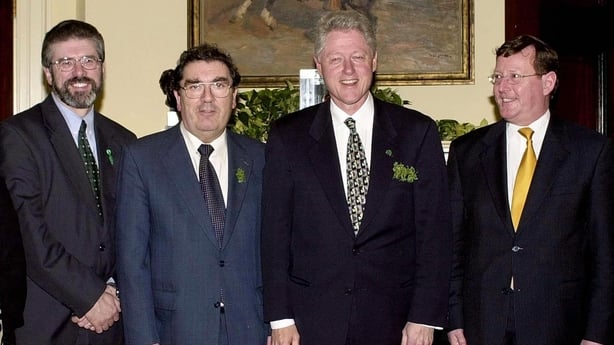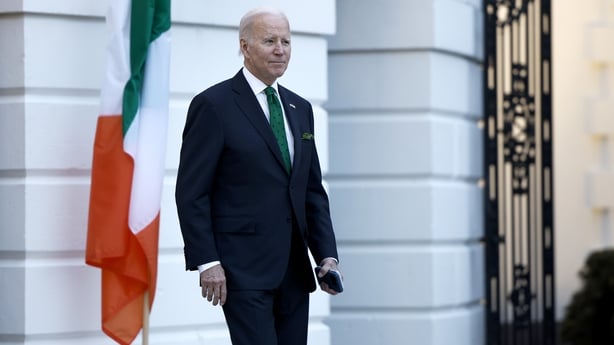One of the key Irish government negotiators for the Good Friday Agreement has said he is disappointed that more was not achieved following the signing of the peace deal 25 years ago.
Former Irish ambassador David Donoghue said that the high hopes that everyone had after the deal was agreed in 1998 have not been realised on the scale that he imagined.
Speaking to Áine Lawlor on the Your Politics Podcast to mark the anniversary of the agreement, Mr Donoghue said he sees the weaknesses in the deal more clearly now.
However, despite his disappointment, he said he remains encouraged that "lives are not being lost anymore and it has brought lasting peace".
'Satisfaction and pride'
"Overall, I have quiet satisfaction and pride that we did achieve something which was good for the island, tempered with a slight feeling of frustration that we don't have more to show for it."
Speaking on the same podcast Trina Vargo, who was an adviser to US Senator Edward Kennedy, said that she too feels "frustrated with how slow progress been".
Despite that, she said we should not lose sight of the accomplishment of the agreement.
Ms Vargo said: "People aren't killing each other every day in Northern Ireland in the way they were. You have a generation of young people who don't really remember or weren't cognisant of what went on in troubles.
"So, I don't think we shouldn't lose sight of the huge accomplishment that the Good Friday Agreement is."
Ms Vargo, who is President of the US Ireland Alliance, which she founded in 1998, said that President Bill Clinton was initially reluctant to get involved in Northern Ireland, but "once he did get in, he was all in".
She said a key turning point came after Mr Clinton visited Belfast in 1995 and was struck by the warm reception he received.
"I remember he called Senator [Ted] Kennedy and said it was one of the best days of his presidency. That trip made a big difference in terms of keeping him in, even when there were setbacks along the way, like the end of the first ceasefire."
She said the US administration made a political calculation that there was very little downside to getting involved.
Ms Vargo credits former US ambassador to Ireland Jean Kennedy-Smith with kickstarting the process by persuading President Clinton to grant a visa to the then Sinn Féin leader Gerry Adams to travel to the US.

"Jean was very instrumental and I'm not sure that she gets sufficient attention for her role in advocating for a visa for Adams at that time."
According to David Donoghue, a number of factors came together, which inspired confidence in the republican movement and among loyalists in the summer of 1997.
"The election of Tony Blair with a solid majority, the election of Bertie Ahern, also with a comfortable majority, and a remarkably well informed and important third player in President Bill Clinton," he said.
Mr Donoghue said: "It was vital to have those factors, in effect the alignment of the stars, as of the summer of 1997.
"There was a lot of preparatory work done before that, but it only really got going once the IRA ceasefire had been restored and there was confidence all round to have the inclusive talks we needed."
Final hours
In the final hours before the deal was agreed Trina Vargo recalls President Clinton being in constant contact by phone.
"There was still a huge concern that things could go awry. There was still a lot of violence. The IRA would be in the talks, out of the talks, the talks would be paused for a time," Ms Vargo said.
Issues such as decommissioning and prisoner releases proved difficult to resolve and David Donoghue said they ultimately came down to reaching a "reasonable compromise".
"An effort was made by Unionists to establish a clear link between ministers taking office in the new executive and decommissioning.
"That was never likely to be part of an agreement because we had been over the ground so often. The only common position one could reach was that decommissioning would be a voluntary process by those who have the weapons.
"The Unionist move at the last minute resulted in a letter of comfort being given by the British prime minister to David Trimble, which I think was valuable for him at that moment, in terms of his own party management."
Twenty-five years on from the Good Friday Agreement, Trina Vargo believes work is still needed on the relationship between Ireland and the US.
"Joe Biden may be the last Irish/American President who wears it on his sleeve. 44 million Americans once claimed Irish heritage. Today, that number is only 34 million.

"The demographics are changing and I am of the firm belief that not nearly enough resources and attention is being given to this issue in a way that is going to be necessary if we're going to be able to sustain these ties for future generations."
Ms Vargo said a lot of effort and resources have been put into building that relationship or it simply will not be there.
"The demographics just dictate that it won't be there in ten or 20 years' time."
David Donoghue said it was a "a uniquely promising state of affairs" that helped to deliver the peace deal and he worries that the same level of commitment is not there anymore.
Looking to the future, he said that a review of the Good Friday Agreement might be the way forward rather than rewriting it.
"There is provision for a review, which would imply tweaking rather than a fundamental change.
"Maybe I will have to revise that in years to come but for the moment I personally think we should hold on to the institutions set up in 1998," he said.






